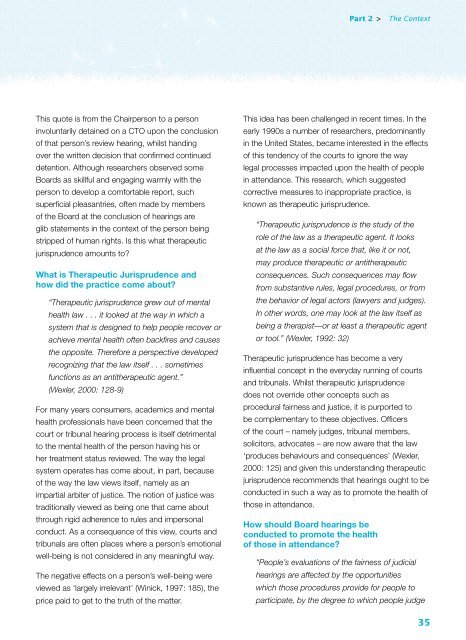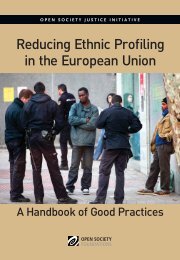Lacking Insight - Community Law
Lacking Insight - Community Law
Lacking Insight - Community Law
- No tags were found...
You also want an ePaper? Increase the reach of your titles
YUMPU automatically turns print PDFs into web optimized ePapers that Google loves.
Part 2 > The ContextThis quote is from the Chairperson to a personinvoluntarily detained on a CTO upon the conclusionof that person’s review hearing, whilst handingover the written decision that confirmed continueddetention. Although researchers observed someBoards as skillful and engaging warmly with theperson to develop a comfortable report, suchsuperficial pleasantries, often made by membersof the Board at the conclusion of hearings areglib statements in the context of the person beingstripped of human rights. Is this what therapeuticjurisprudence amounts to?What is Therapeutic Jurisprudence andhow did the practice come about?“Therapeutic jurisprudence grew out of mentalhealth law . . . it looked at the way in which asystem that is designed to help people recover orachieve mental health often backfires and causesthe opposite. Therefore a perspective developedrecognizing that the law itself . . . sometimesfunctions as an antitherapeutic agent.”(Wexler, 2000: 128-9)For many years consumers, academics and mentalhealth professionals have been concerned that thecourt or tribunal hearing process is itself detrimentalto the mental health of the person having his orher treatment status reviewed. The way the legalsystem operates has come about, in part, becauseof the way the law views itself, namely as animpartial arbiter of justice. The notion of justice wastraditionally viewed as being one that came aboutthrough rigid adherence to rules and impersonalconduct. As a consequence of this view, courts andtribunals are often places where a person’s emotionalwell-being is not considered in any meaningful way.The negative effects on a person’s well-being wereviewed as ‘largely irrelevant’ (Winick, 1997: 185), theprice paid to get to the truth of the matter.This idea has been challenged in recent times. In theearly 1990s a number of researchers, predominantlyin the United States, became interested in the effectsof this tendency of the courts to ignore the waylegal processes impacted upon the health of peoplein attendance. This research, which suggestedcorrective measures to inappropriate practice, isknown as therapeutic jurisprudence.“Therapeutic jurisprudence is the study of therole of the law as a therapeutic agent. It looksat the law as a social force that, like it or not,may produce therapeutic or antitherapeuticconsequences. Such consequences may flowfrom substantive rules, legal procedures, or fromthe behavior of legal actors (lawyers and judges).In other words, one may look at the law itself asbeing a therapist—or at least a therapeutic agentor tool.” (Wexler, 1992: 32)Therapeutic jurisprudence has become a veryinfluential concept in the everyday running of courtsand tribunals. Whilst therapeutic jurisprudencedoes not override other concepts such asprocedural fairness and justice, it is purported tobe complementary to these objectives. Officersof the court – namely judges, tribunal members,solicitors, advocates – are now aware that the law‘produces behaviours and consequences’ (Wexler,2000: 125) and given this understanding therapeuticjurisprudence recommends that hearings ought to beconducted in such a way as to promote the health ofthose in attendance.How should Board hearings beconducted to promote the healthof those in attendance?“People’s evaluations of the fairness of judicialhearings are affected by the opportunitieswhich those procedures provide for people toparticipate, by the degree to which people judge35
















